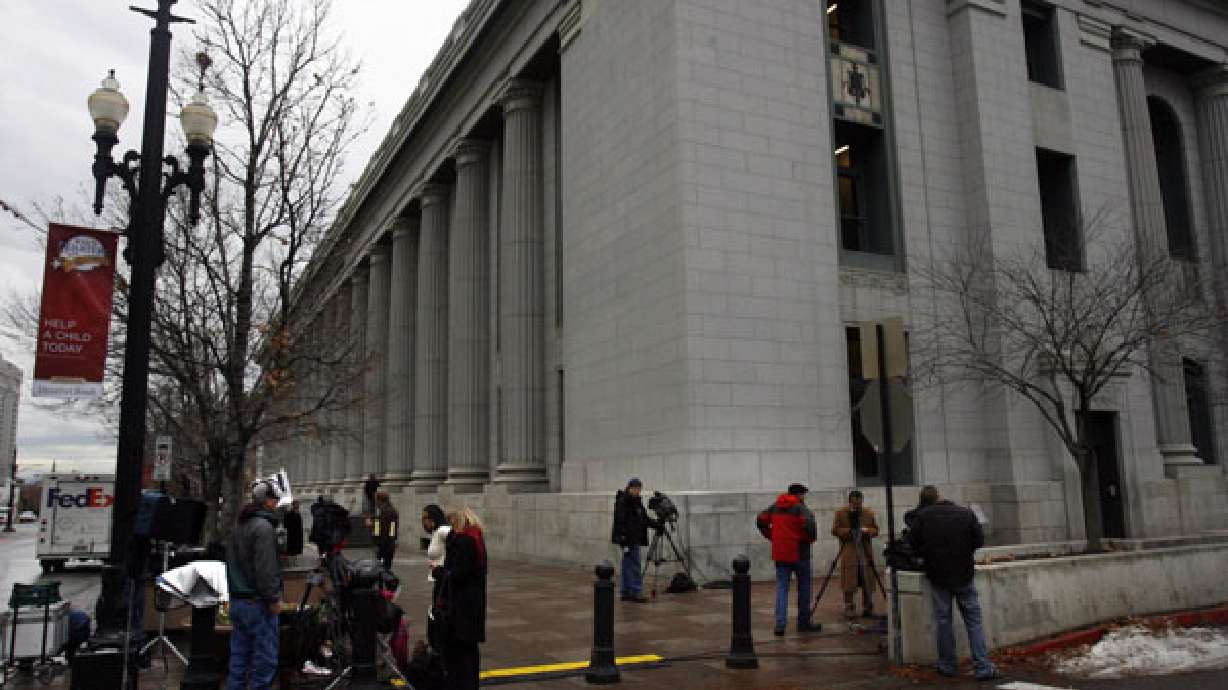Estimated read time: 4-5 minutes
This archived news story is available only for your personal, non-commercial use. Information in the story may be outdated or superseded by additional information. Reading or replaying the story in its archived form does not constitute a republication of the story.
SALT LAKE CITY -- Jurors in the Brian David Mitchell trial resumed deliberations Friday morning. The panel of seven men and five women deliberated about three hours Thursday night without reaching a verdict for the accused kidnapper of Elizabeth Smart.
Mitchell faces two counts: kidnapping and illegally transporting a minor across state lines for the purpose of having sex.
Jurors can find him guilty, or not guilty by reason of insanity. They also could consider a not guilty verdict, but defense attorneys have conceded that Mitchell kidnapped Smart from her bedroom in June 2002 and raped her almost daily during her nine months of captivity.
During four weeks of testimony they tried to prove their client was mentally ill and not responsible for his actions. Defense attorney Robert Steele said Mitchell's actions were colored by long-standing delusional beliefs.
Prosecutors have spent that time painting Mitchell as a sadist, pedophile and narcissist.
The defense said Mitchell does have personality disorders such as narcissism and anti-social personality issues, but said he can still suffer from a mental illness, such as paranoid schizophrenia or delusional disorder.
During Thursday's closing arguments, prosecutors gave the jury three reasons why they don't believe Mitchell is insane: his delusions are not fixed or sincerely held; his religious ideas have a cultural explanation — they came from LDS culture, not out of thin air — and there is no evidence to support a dramatic decline in Mitchell's condition, which is characteristic of a mental illness.
Prosecutors say that Mitchell knew "exactly what he was doing."
Steele said one couldn't distinguish cleanly between Mitchell's mental illnesses and his personality disorders. It's all "wrapped together," he said.
He cited numerous examples of Mitchell's abnormal, anti-social behavior, including leaving a mouse on the stove and feeding his stepdaughter her pet rabbit.
The jurors come from different religious backgrounds; some are LDS, a couple are Catholic, others are Presbyterian and one is Greek Orthodox. The jury includes a former nurse, health care workers; one juror lived in California at the time of Smart's abduction.
Doug Larsen, a friend of Mitchell's in the 1980s, spoke to KSL outside court Thursday night. He testified for the defense and has been in court for most of the trial.
"To me, if I was a jury member, I'd be completely conflicted," he said. "I wouldn't have any idea what to do with all that forensic, psychological stuff."
However, Larsen did have a prediction of how he thinks this case will turn out. "I'd be very shocked and surprised if the jury didn't come back with a verdict of guilty," he said.
Elizabeth Smart has been in court every day since the trial began almost a month ago. She is expected to be in court this morning awaiting that verdict with her family.
Defense attorneys have said Mitchell seems indifferent awaiting the verdict and expects to be found guilty.
KSL spoke with several attorneys who are not involved with the case about what the jury is dealing with right now. All agree it comes down to expert testimony from both sides of the case.
"In essence it's a contest. Contest maybe isn't the right word, but the jury will need to consider the credentials of each of the experts, the testimony of each of the experts, what the expert saw or did or relied upon in reaching their conclusion," said Marc Rasich, a partner at Stoel Rives.
Attorney Greg Skordas said, "There's some sense of community to making sure justice is done. Whatever that is -- some people might think that's finding him guilty of everything and putting him in prison forever. But it also might be finding him not guilty by recent of insanity and having him hospitalized for probably the rest of his life."
Skourdas believes a verdict will come down today. He said the length of deliberations does not necessarily yield a clue to the jury's verdict.
"I think the government put on a very, very strong case and I think the defense had a difficult burden because they have an uncooperative client," Skourdas said Friday morning. He said in more than 100 trials, he's had only one in which his client was not sitting next to him during the closing arguments.
"That's really hard, because the jury likes to sort of put a face to it. If all they're getting is somebody singing Christmas carols in the morning, that's not a good impression they're getting. That lends into the mental health issue as well, but I think the government put on a very, very strong case."
Forensic psychiatrist Dr. Michael Welner said it took Elizabeth Smart enormous strength to fight to survive, then speak up. He said it will resonate with other young rape and abuse victims.
"How many cases have I worked on where I wish I had a witness who was willing to talk to me, but she is too traumatized and she's too scared, and the case falls apart," he said.
He said Smart's testimony was valuable regardless of the outcome of the case.
Stay with ksl.com, KSL NewsRadio and KSL TV for updates as they become available.
------
Story written with contributions from Courtney Orton, Andrew Adams and the DMC News team.








